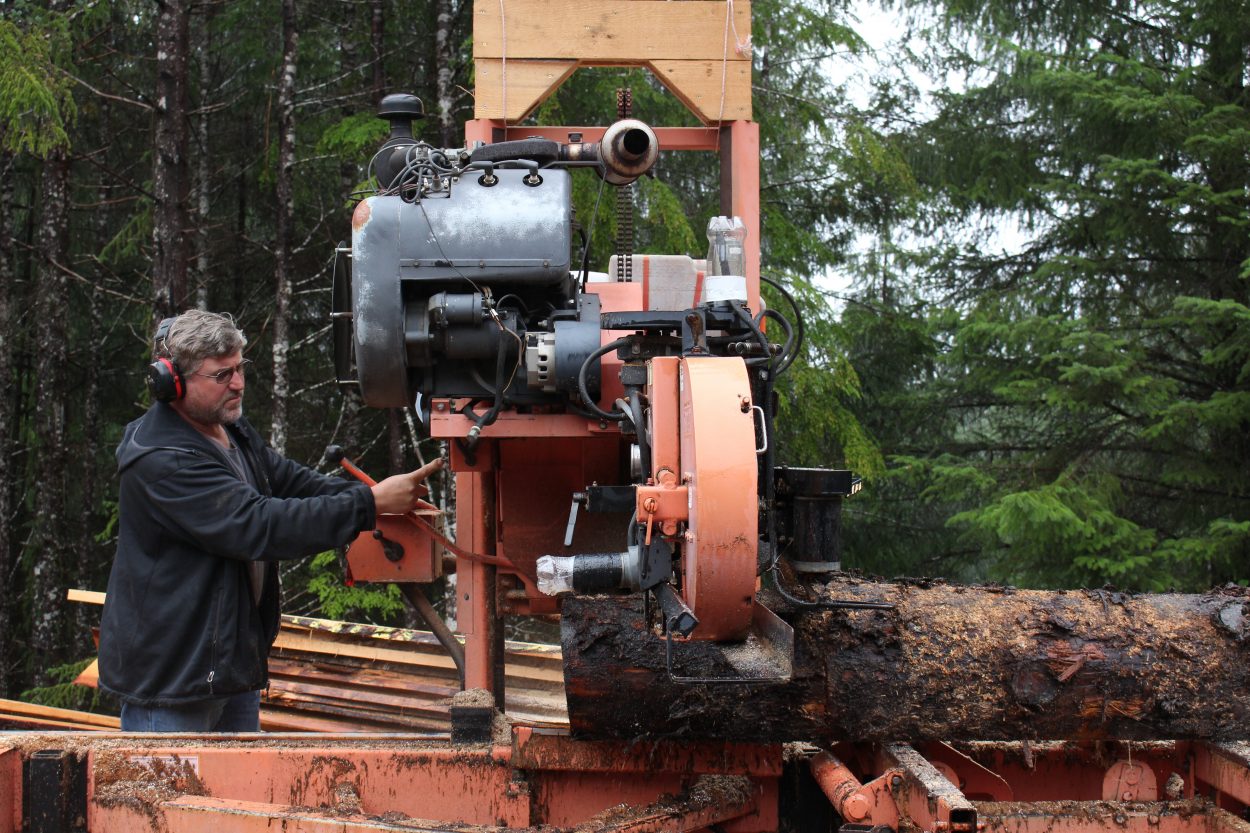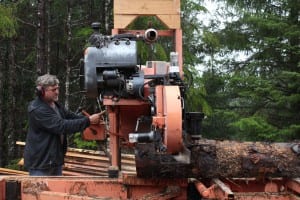Southeast residents will be able to buy locally milled lumber in the future as small scale timber sales begin on Mitkof Island. The trees are mostly from young growth stands, comprised of what some would call “trash wood,” but small scale mills are challenging that notion.
Audio Player
Chris Fry isn’t superficial when it comes to logs. As a small mill operator, he says it’s necessary to look beyond the barks surface. “It’s good to be able to be able to look at these logs and say, ‘I know there’s a good patch of wood in there and I can some good some stuff on that one.'”
This way of thinking is fairly new. Fry has been in the milling business for 14 years, mostly in Washington State. He says larger mills operators would take a glance at piece of knotty spruce and make a judgment call. “They’re going to take a look at that log and go, ‘eh it’s too ugly’ and they’re going to throw that over in their firewood.”
But Fry assesses it and sees dollar signs. Like a skilled butcher, he knows how to parcel up the cuts to sell for maximum profit. He glides a band saw over a ten-foot-long piece of spruce, rotating the sides until it’s a smooth block. From there, it will be divided into trim or decking. Fry also supplies salvage pieces for installation art, and he uses alder or what he calls music wood to make guitars. He’s part of a growing number of mill operators who can use their skills for more specialized projects.
“There’s a lot of small mills around because the small mills can do jobs that the big mills just can’t.” That’s because the big mills are under a time crunch. They crank out large orders and need a large supply of logs to turn a profit. What Fry is doing operates more like a boutique. “I don’t mind spending the extra time. I can do that and still make money at this.”
The Petersburg Economic Development Council also saw this venture as an opportunity to diversify the local economy, but for it to work, there would have to be a steady supply of timber. When the Forest Service announced they would be optioning micro logging sales on Mitkof island, it seemed like the perfect opportunity for small mill operators. There was only one thing missing says PEDC Coordinator, Liz Cabrera. “During those discussions we realized that part of the problem was they had probably never had to sell the products on the markets.”
Enter Chris Fry: experienced small mill operator and now the marketing liaison for the project, Alaska Mills. The PEDC was recently awarded over $23 thousand dollars from the National Forest Foundation which they’re using to fund Fry’s expertise. He’ll put other small mill operators in touch with clients from the lower 48, even Asia. The timber sale on Mitkof is unique because it’s optioning a lot of young growth trees. “What we’re doing is we’re not taking these huge clear cuts. They’re more these thinning type operations. That wood will be sold locally and some of it down south,” says Fry.
Adam Liljeblad is the Director of Conservation Awards at the National Forest Foundation—a nonprofit with the slogan “Protecting America’s Backyard.” He says small scale logging operations like this provide sustainability. “There’s a lot more care being taken to make sure smart land management decisions are being made,” says Liljeblad.
Small mill operators will have access to hemlock, red cedar, and yellow cedar. Fry says the alder they’ll harvest grows like an invasive weed. “It’s actually going to grow faster than we’re going to be able to take it down.”He says Mitkof is covered in it. Alder is an orange, knotty looking wood that’s become popular for furniture and cabinet making. 10 years ago, it went by a less dignified name. “They called it trash wood and things like that, people called it garbage wood, and it’s actually a good marketable wood. Actually, in Washington the price of alder is higher than the price of Douglas fir.
Small mill operators are proving that certain logs aren’t trash. You just have to see the profit within.













